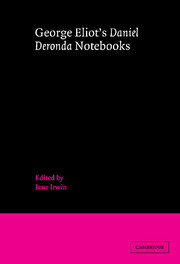PFORZHEIMER NOTEBOOK 707
Published online by Cambridge University Press: 01 June 2011
Summary
Pf707 1 to 73
Contents and miscellaneous notes
Pf 707 1, 2, 3
The inscription on Pf 707 1 – ‘“George Eliot's Notes”’ – was perhaps added by Mrs Ouvry. ‘1875’, written in the upper right corner of the page, has been thought to represent the starting date for GE's use of this notebook, whose earliest datable entries are from January 1876 – the ‘Hymn of St. Francis’ and the excerpt from Leopardi's Canti (Pf 707 29 and 33). On 13 January 1875, GE began to write ‘the part about Deronda’ (DD ch. 15), and on 19 May she let John Blackwood have the first twenty chapters. These incorporate information on the settlement of family estates, acquired in January, and on nervous mimicry and the commercial panic of 1866, from her reading in May. Since the GHL Diary records that ‘Polly read opening chapters of her new novel’ on 11 June 1874, it would seem likely that GE revised those early chapters in the light of her later reading. If she did not read Charlotte Yonge on Christian names (Pf 707 10–16, 26–27) before January 1875, she must even have renamed Gwendolen. Alternatively, entries in this notebook must predate 1875 and overlap with those in Pf 711. A note on Pf 707 9 which may be linked with autumn 1873 tends to support this earlier alternative date.
The list of books on Pf 707 1 includes four also listed in Pf 710. The last four titles were added no earlier than 1876, when Hertzberg's Geschichte Griechenlands and Sale's new edition of the Koran were published. The final entry is for the second edition of Haug's Essays on the Parsis, published in 1878.
- Type
- Chapter
- Information
- George Eliot's 'Daniel Deronda' Notebooks , pp. 433 - 492Publisher: Cambridge University PressPrint publication year: 1996



